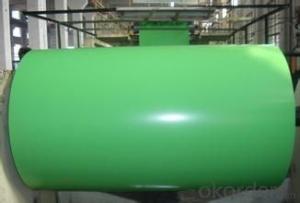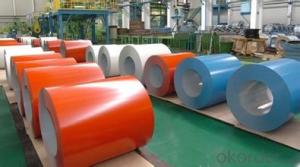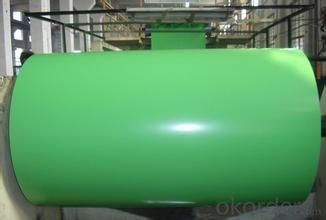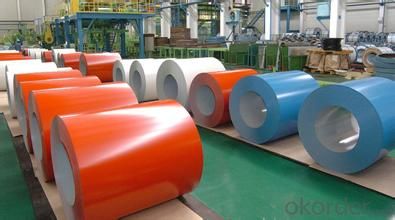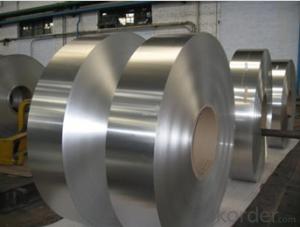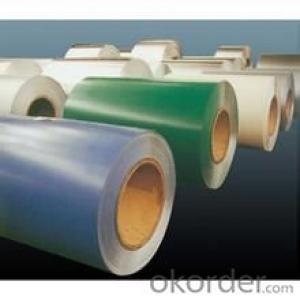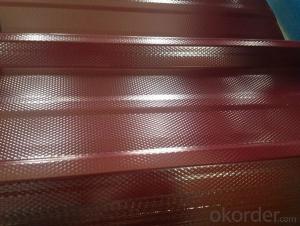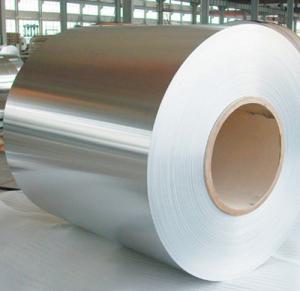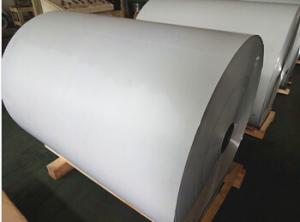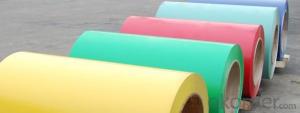Quality Aluminum Coil - Full-Coloured Alu-Coil
- Loading Port:
- China Main Port
- Payment Terms:
- TT OR LC
- Min Order Qty:
- -
- Supply Capability:
- -
OKorder Service Pledge
OKorder Financial Service
You Might Also Like
Aluminium is a relatively soft, durable, lightweight, ductileand malleablemetalwith appearance ranging from silvery to dull gray, depending on the surfaceroughness. It is nonmagnetic and does not easily ignite. A fresh film ofaluminium serves as a good reflector (approximately 92%) of visible lightand an excellent reflector (as much as 98%) of medium and far infraredradiation. The yield strength of pure aluminium is 7–11 MPa,while aluminium alloys have yield strengths ranging from200 MPa to 600 MPa. Aluminium has about one-third the densityand stiffness of steel. It is easily machined,cast, drawn and extruded.
Aluminium alloys (or aluminum alloys; see spellingdifferences) are alloysin which aluminium(Al) is the predominant metal. The typical alloying elements are copper, magnesium,manganese,silicon,tin and zinc. There are twoprincipal classifications, namely casting alloys and wrought alloys, both of which are furthersubdivided into the categories heat-treatableand non-heat-treatable. About 85% of aluminium is used for wrought products,for example rolled plate, foils and extrusions.Cast aluminium alloys yield cost-effective products due to the low meltingpoint, although they generally have lower tensile strengthsthan wrought alloys. The most important cast aluminium alloy system is Al–Si,where the high levels of silicon (4.0–13%) contribute to give good castingcharacteristics. Aluminium alloys are widely used in engineering structures andcomponents where light weight or corrosion resistance is required
Specification:
Alloy: AA1050, 1060, 1100,AA3003, 3005, 3015, 5052, 5754, 5083,8011, etc
Temper: H14/16/18/22/24/32,HO etc.
Thickness: 0.2mm—100mm
Width: 100mm—2300mm (Can be slitted)
Inner Diameter:508MM
Coil Weight:500kg-3000kg(Max.)
Application:Foil stock, Circles, Roofing, Can stock, Marine plate,Anti-slipery purpose in vehicles, packing and appliance.
Features:
1. Excellent quality of products
2. Quick delivery
3. Best service to clients
4. BV,SGS avalible
5. No buckle o waveness
6. Tension leveling
7. Certificate of Origin
8. Form A,E
Packaging Detail:
Carton ,Woodenpallet with plastic protection packing ,standard seaworthy packing or as yourrequest.
Production Capacity:
AnnualProduction capacity of 600,000 tons.
Products areexported to United States, Canada, U.A.E, Brazil, Mexico,Thailand, Vietnam,Nigeria etc, over 100 countries andregions all over the world.
Production Line:
CNBM aluminumproduction base is comprised of 18 aluminumannealers, 10 coil and foilmills, 4 continuous production lines, 2hot rolling production line and 3prepainted lines.
FAQ:
1. What is the form of payment?
Normally 30% TT, L/C
2. Type of quotation?
FOB, CFR, CIF
3. Port of loading?
Shanghai port
4. Delivery time?
30 days after client’s deposit
- Q: They say aluminum can be found in deodorants.And this aluminum is absorbed by the skin and block pores.Does the amount of aluminum affect the rate of how it dries up?
- Like any chemical reaction quantity would matter. Aluminum Chloride is one of several active ingredients. It works by doing two things. The first is it is an astrigent which causes the sweat glands to shrink or close up. The second is that it reacts with sweat to form a gell like substance that plugs up the pores. The combined effect is to stop sweating. The two effects are temporary and the pores eventually open up and clear themselves out. These two drying effects of aluminum chloride are fast acting and work upon application. So to answer your question i would consider aluminum as a means of making a deoderant dry faster by stopping the sweat from leaving the pores.
- Q: What are the different sizes available for aluminum coils?
- Aluminum coils come in various sizes to accommodate the diverse needs of different industries and applications. The sizes of aluminum coils can vary depending on factors such as intended use, manufacturing process, and customer preferences. In general, aluminum coils can be found in a range of thicknesses, typically spanning from 0.2mm to 8mm. The width of aluminum coils can range from a few inches to over 60 inches. As for length, aluminum coils can be customized, but standard lengths usually fall between 1000mm and 6000mm. The specific sizes of aluminum coils available may also be influenced by the manufacturing capabilities of the supplier or manufacturer. Some suppliers may offer a wide selection of sizes to cater to different customer demands, while others may have a more limited range. It is important to note that the availability of specific sizes may be subject to minimum order quantities or lead times. Therefore, it is advisable to consult with the supplier or manufacturer to inquire about the available sizes and any associated limitations or requirements. Overall, the assortment of sizes for aluminum coils allows customers the flexibility to select dimensions that best suit their specific applications and requirements.
- Q: What is the elongation of aluminum coils?
- The elongation of aluminum coils refers to the amount of stretching or deformation that can occur in the material before it breaks or becomes permanently damaged. It is a measure of the ductility or ability of aluminum to withstand tensile forces without fracturing.
- Q: Are there any limitations to the widths of aluminum coils?
- Yes, there are limitations to the widths of aluminum coils. The width of aluminum coils is typically determined by various factors such as the manufacturing process, equipment capabilities, and industry standards. One limitation is the maximum width that the manufacturing equipment can handle. Coil processing machines have specific width capacities, which generally range from a few inches to several feet. If an aluminum coil exceeds the maximum width that the machine can accommodate, it may not be possible to process it. Another limitation is related to transportation and handling. Aluminum coils that are too wide may not fit within standard shipping containers or may be difficult to maneuver during transportation. Additionally, wide coils may require specialized handling equipment or additional support, which can increase costs and logistical challenges. Industry standards and application requirements also play a role in determining the limitations of aluminum coil widths. Different industries and applications have specific width requirements for their products. For example, the construction industry may have specific width specifications for roofing or cladding materials, while the automotive industry may have different requirements for body panels. Manufacturers need to consider these standards and customer needs when determining the maximum and minimum widths of aluminum coils. In summary, while aluminum coils can be produced in various widths, there are limitations due to manufacturing equipment capabilities, transportation constraints, and industry standards. These limitations must be considered to ensure the efficient production, handling, and utilization of aluminum coils in different applications.
- Q: Are there any safety considerations when handling aluminum coils?
- Yes, there are safety considerations when handling aluminum coils. Aluminum coils can be sharp and have the potential to cause cuts or punctures if not handled carefully. Additionally, aluminum dust or fumes generated during handling or cutting processes can pose health hazards if inhaled. It is important to wear appropriate personal protective equipment, such as gloves and safety glasses, and to work in a well-ventilated area to minimize the risk of injury or exposure to harmful substances.
- Q: How do aluminum coils contribute to energy efficiency in buildings?
- Aluminum coils contribute to energy efficiency in buildings by improving the heating and cooling systems. These coils are commonly used in HVAC systems, where they help in transferring heat effectively. The high thermal conductivity of aluminum allows for faster heat transfer, resulting in more efficient cooling and heating processes. Additionally, aluminum coils are lightweight and corrosion-resistant, reducing the load on the HVAC system and ensuring its longevity. Overall, the use of aluminum coils in buildings helps to conserve energy and reduce utility costs.
- Q: How are aluminum coils stored in a warehouse?
- Aluminum coils are typically stored in a warehouse in a way that ensures their protection and easy accessibility. The coils are usually stacked in rows, either vertically or horizontally, depending on the available space and the weight of the coils. To prevent damage and maintain their shape, the coils are often stored on pallets or racks that provide support and stability. Additionally, the coils may be wrapped in protective materials such as shrink wrap or plastic sheets to shield them from dust, moisture, and other potential hazards. Proper labeling and organization are also crucial to facilitate inventory management and efficient retrieval. Overall, the goal of storing aluminum coils in a warehouse is to maximize space utilization, minimize the risk of damage, and ensure their readiness for shipment or further processing.
- Q: Are aluminum coils compatible with different joining methods?
- Different joining methods can be used with aluminum coils. Aluminum, a versatile metal, can be joined using techniques like welding, brazing, soldering, and mechanical fastening. The choice of method depends on the specific application and desired joint properties. To join aluminum coils, welding is commonly used as it creates a strong and durable bond. Various welding techniques, such as MIG, TIG, and resistance welding, can be employed based on the thickness and alloy type. Brazing is another effective method for joining aluminum coils. It involves heating a filler material with a lower melting point than the base metal to create a strong joint. Brazing is suitable when joining aluminum coils with dissimilar metals. For thin aluminum coils or when a lower temperature method is necessary, soldering is a suitable option. It involves melting a low-temperature alloy (solder) to join the coils together. Soldering finds common use in electronics and plumbing applications. Mechanical fastening methods like bolts, screws, rivets, or clips can also be used to join aluminum coils. These methods provide a reliable and removable joint, making them appropriate for applications requiring disassembly. In conclusion, different joining methods, including welding, brazing, soldering, and mechanical fastening, can be used with aluminum coils. The choice depends on factors like the application, alloy type, and desired joint properties.
- Q: Can aluminum coils be used in the production of fire-resistant structures?
- Yes, aluminum coils can be used in the production of fire-resistant structures. Aluminum has a high melting point and excellent thermal conductivity, making it suitable for applications where fire resistance is required. Additionally, aluminum does not burn and can help to prevent the spread of fire, making it a popular choice for fire-resistant structures such as fire doors, fire-resistant walls, and fireproof insulation.
- Q: This question asks for precautions that should be taken when handling aluminum coils to ensure safety.
- <p>When handling aluminum coil, it's crucial to follow safety measures to prevent accidents and injuries. Always wear appropriate personal protective equipment (PPE), including gloves, safety glasses, and closed-toe shoes. Ensure that the work area is well-lit and free from clutter to avoid trips and falls. Use lifting equipment, such as cranes or forklifts, for heavy coils and never attempt to lift them manually. Keep the coils dry to prevent corrosion and ensure they are stored properly on wooden pallets or racks to prevent damage. Be aware of the risk of aluminum dust, which can be a fire hazard, and ensure proper ventilation is in place. Regularly inspect the coil for any sharp edges or damage that could cause injury. Always follow the manufacturer's guidelines and adhere to local safety regulations.</p>
Send your message to us
Quality Aluminum Coil - Full-Coloured Alu-Coil
- Loading Port:
- China Main Port
- Payment Terms:
- TT OR LC
- Min Order Qty:
- -
- Supply Capability:
- -
OKorder Service Pledge
OKorder Financial Service
Similar products
Hot products
Hot Searches
Related keywords
